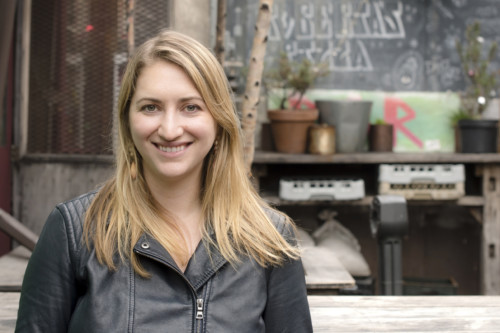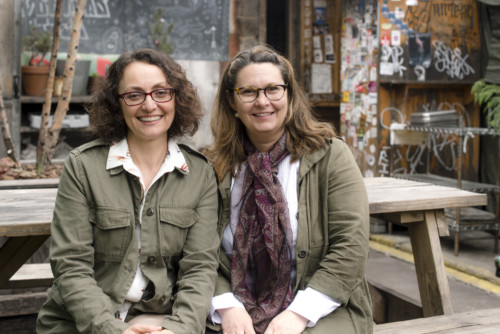
Tuning In To Brooklyn’s Coolest Food Radio Station
“All of our shows are produced by people who are practitioners and experts in their fields– not necessarily people who have a long history doing radio or doing podcasts,” Caity Moseman Wadler explains, sitting at one of the picnic tables in the open air of Roberta’s Pizza. Wadler is the Executive Director of Heritage Radio Network, an online radio station inspired by Slow Food founder Carlo Petrini’s pirate radio of the 1970s. Charmingly located in an old green shipping container at the back of Roberta’s Pizza (where the Bee Sting Pizza is a must-have), Heritage Radio Network hosts 34 weekly shows, each of which approaches food with a different perspective, from Radio Cherry Bombe‘s profiles of women in the culinary world to Feast Meets West‘s study of how Asian foods and flavors make their way to America.
“People are listening to Heritage to hear the authentic voices of people who are working in the field and people who won’t be featured in mainstream media or who won’t be in a lifestyle publication,” Wadler says. “But they’re the people who are actually hands-on, making our food, and creating change in the food system. That’s who we want to hear from, that’s who our audience wants to hear from. I think anyone can tell a story.”
As the third show ever added to the Heritage Radio Network roster, We Dig Plants has been there since the very beginning, and has been carrying out their mission of “examining our human interaction with plants via authors, industry professionals, historians, plants people, cooks, gardeners, and artists, [delving] into the magic, power and influence of plants within a global context” since 2009.
“We call it ‘the culture of horticulture,'” one of the two co-hosts of We Dig Plants, Alice Marcus Kreig, says of the show’s mission. “It’s not a how-to show at all. We can get into those tangible details, but we really like how people interact with plants and how everybody has a story about a plant. Their grandmother, a smell that evokes their childhood…”
Carmen Devito, her co-host, picks up: “Those stories where the horticulture intersects with other things and kind of gets into the culture different ways, different avenues… We think about the culture at large. That’s why last year we did the series on presidents. And there was positive feedback and also some people didn’t like it. They felt that politics and plants shouldn’t mix. We don’t agree.”
“It’s hard to separate as far as I’m concerned!” Kreig chimes in. “Hello– colonialism?!”
“We’re kind of like horticultural detectives. We go digging around for stories that other people might not find.”
“But it’s a dialogue,” Devito resumes diplomatically. “We want to give voices to people who might not be put in a glossy gardening magazine… There’s a lot of celebrity and cult of celebrity [in the horticulture world] and Alice and I wanted to find the behind-the-scenes people. Hollywood is finally reaching out to that with Hidden Figures and we believe in that…That’s why we did ‘Horticulture Heroes’– because there are these guys who pushed the envelope scientifically and culturally…The kid who figured out how to pollinate vanilla– why vanilla is so ubiquitous now is because of this teenage kid! Those are the weirdo stories that we go hunting for. We’re kind of like horticultural detectives. We go digging around for stories that other people might not find…That’s the importance of venues like Heritage. It’s a voice.”
“And it is not fake news!” Kreig laughs. “It is real news.”
I
Particularly at Heritage Radio Network’s inclusive, podcasts are a kind of democratic medium of media, accessible both to those who make and those who consume. Devito lists off the benefits: “The options, the freedom, the flexibility…”
“These are not fireside chats,” Kreig jokes.
Yet Heritage Radio Network does have a streak of the old-fashioned in it– after all, its roots are intertwined with the patient progress and mindful consumption of the Slow Food Movement. Though listeners can keep the interviews on while they perform other tasks, each episode always approaches its topic thoroughly and thoughtfully, a kind of auditory equivalent to a complete, whole meal. The stories told are not only those that need to be told, but are told by those who should be telling them. Like Slow Food, it is a respectful medium of exchange.
As the interview comes to a close, Devito reflects on the show’s very ethos: “We always want to learn more and that’s what the podcast is great for.”
To listen to We Dig Plants or other Heritage Radio Network podcasts, check out their website.



































